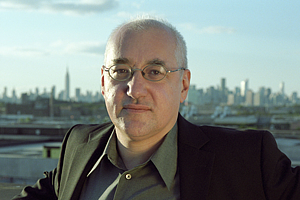Institute for Advanced Study Appoints Sebastian Currier as Artist-in-Residence

PRESS CONTACT: Katherine Belyi, (609) 951-4406
The Institute for Advanced Study has announced the appointment of composer Sebastian Currier as Artist-in-Residence beginning July 1, 2013. Currier will curate the Institute’s Edward T. Cone Concert Series as well as pursue his creative and intellectual work as part of the Institute’s community of scholars.
Currier received the prestigious Grawemeyer Award in 2007. His music has been called, in the Washington Post, “lyrical, colorful, firmly rooted in tradition, but absolutely new.”
His music has been performed by artists and orchestras worldwide. In 2007–08, his chamber music was presented by the Berlin Philharmonic, including three world premieres. The violinist Anne-Sophie Mutter has performed Currier’s Aftersong extensively in the United States and Europe, including in New York’s Carnegie Hall and London’s Barbican. Mutter premiered Currier’s violin concerto Time Machines with the New York Philharmonic in 2011, a piece called “rapturously beautiful” by Anthony Tommasini in the New York Times.
“We are immensely pleased that Sebastian Currier will be coming to the Institute as Artist-in-Residence,” said Robbert Dijkgraaf, Director and Leon Levy Professor at the Institute. “We see this appointment as a reflection of the growing role of the music program and the wonderful contributions of previous Artists-in-Residence. The Institute and the community of music lovers in the Princeton area will be greatly enriched by his distinctive voice.”
Currier has created several works that involve electronic media and video. In Next Atlantis, premiered by the American Composers Orchestra at Carnegie Hall in 2010, a string orchestra converses with recorded sounds of water, evoking the lost city. In Nightmaze, a multimedia piece based on a text by Thomas Bolt, a protagonist dreams he is rushing along a dark highway, where strange road signs loom and disappear. “Currier’s rich and imaginative music sets the right tone,” wrote the Times, “with its fractured and dissonant baroque-like gestures leading off like highway exits into the void and hinting at distant reservoirs of emotion and yearning.” New works premiering during the 2012–13 season include Deep-Sky Objects, for soprano and ensemble; Fifteen Minutes, for flute, harp, and viola; and Quanta, for orchestra.
“I look forward very much to participating in the intellectual and creative life of the Institute, which is an extraordinary, unprecedented organization,” said Currier. “I am thrilled to have the opportunity to interact with such an exciting and distinguished community.”
The Artist-in-Residence program was established at the Institute for Advanced Study in 1994 to create a musical presence within the Institute community and to have in residence a person whose work could be experienced and appreciated by scholars from all disciplines. Artists-in-Residence organize the Edward T. Cone Concerts at the Institute, an annual series of free concerts that are open to the public. The series is named for Edward T. Cone, a distinguished composer, musical scholar, and Princeton University Professor who had longstanding ties to the Institute.
Pianist Robert Taub was the first Artist-in-Residence from 1994 to 2001, followed by composer Jon Magnussen, who served as Artist-in-Residence from 2000 to 2007, and Paul Moravec, who served as Artist-in-Residence from 2007 to 2008 and Artistic Consultant from 2008 to 2009. Currier succeeds composer and clarinetist Derek Bermel, who was named Artist-in-Residence in 2009.
“Sebastian’s creative integrity, brilliance and boundless curiosity are a fine match for the Institute,” said Bermel, “During my tenure here, I’ve been both inspired by working alongside first-rate scientists and scholars, and touched by the seriousness with which this community engages with music. I’m excited to see what this new chapter in the Artist-in-Residence program brings.”
Currier has received numerous honors in addition to the Grawemeyer Award, including the Berlin Prize, the Rome Prize, a Guggenheim Fellowship and an Academy Award from the American Academy of Arts and Letters. He has held residencies at the MacDowell and Yaddo colonies, and from 1999–2007 he taught at Columbia University. He holds a Doctor of Musical Arts degree from the Juilliard School.
Currier’s Quartetset/Quiet Time album (New World Records, 2006), recorded by the Cassatt Quartet, makes listeners “think about music itself,” Anne Midgette wrote in the New York Times, while also being “eminently listenable.” Other recordings of his work include Time Machines, with Anne-Sophie Mutter and the New York Philharmonic on Deutsche Grammophon (2011); Next Atlantis, with the Ying Quartet on Naxos (2010); and On the Verge from Music from Copland House, featuring Static and other chamber works.
Currier’s music is published by Boosey & Hawkes.
About the Institute for Advanced Study
The Institute for Advanced Study is one of the world’s leading centers for theoretical research and intellectual inquiry. The Institute exists to encourage and support curiosity-driven research in the sciences and humanities—the original, often speculative thinking that produces advances in knowledge that change the way we understand the world. Work at the Institute takes place in four Schools: Historical Studies, Mathematics, Natural Sciences and Social Science. It provides for the mentoring of scholars by a permanent Faculty of approximately 30, and it ensures the freedom to undertake research that will make significant contributions in any of the broad range of fields in the sciences and humanities studied at the Institute.
The Institute, founded in 1930, is a private, independent academic institution located in Princeton, New Jersey. Its more than 6,000 former Members hold positions of intellectual and scientific leadership throughout the academic world. Thirty-three Nobel Laureates and 40 out of 56 Fields Medalists, as well as many winners of the Wolf and MacArthur prizes, have been affiliated with the Institute.